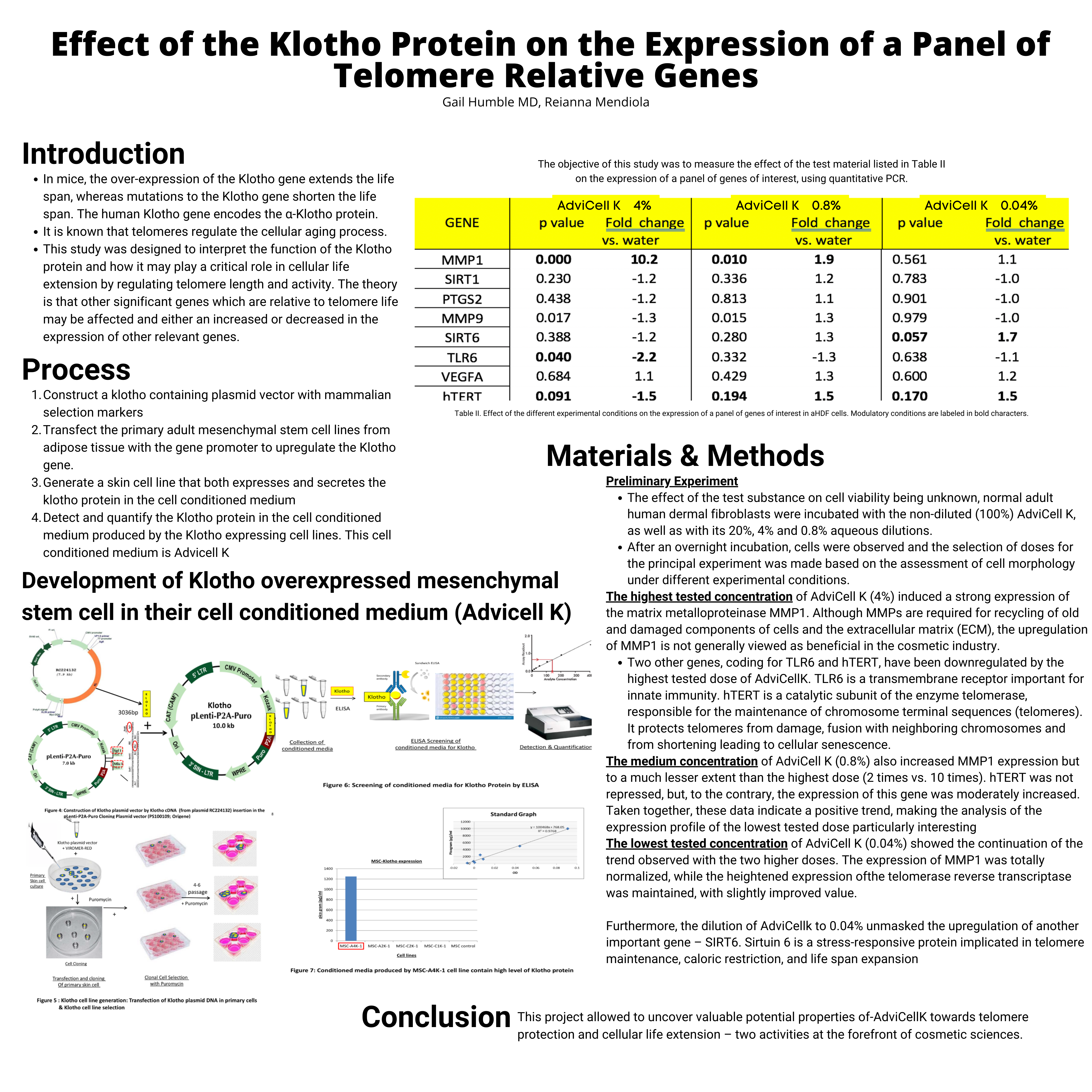
Speaker
 Gail M. Humble, MD
Gail M. Humble, MD
Klotho Skin, San Francisco, CA
Dr. Humble is a medical doctor specifically in aesthetic anti-ageing based in San Francisco and Los Angeles locations. Her undergraduate studies were in genetics and regenerative medicine has been her passion. She lectures nationally and internationally on anti-ageing and aesthetic medicine. She is a frequent lecturer at the World Congress of Anti-Ageing Medicine and is a published author of research-based, medical and non-medical articles. Her published medical research articles can be found within medical journals including Dermatologic Surgery and the Journal of Facial and Plastic Surgery. With a core belief that our external beauty should reflect the beauty we feel inside, Dr. Humble founded Klotho Skin with the intention to achieve a truly effective method to maintain youthful skin.
Abstract
Introduction: In mice, the overexpression of the Klotho gene extends the life span, whereas mutations to the Klotho gene shorten the life span. The human Klotho gene encodes the α-Klotho protein, which is a multifunctional protein that regulates the metabolism of phosphate, calcium, and vitamin D. It is known that telomeres regulate the cellular aging process. This study was designed to interpret the function of the Klotho protein and how it may play a critical role in cellular life extension by regulating telomere length and activity. The theory is that other significant genes which are relative to telomere life may be affected and either an increased or decreased in the expression of other relevant genes. For the purpose of this study, we used Advicell K. Advicell K is the cell conditioned medium containing the Klotho protein and second-generation growth factors which was harvested after using our patented process to upregulate the Klotho gene in stem cells.
Objective: The objective of this study was to measure the effect of the test material, Advicell K, on the expression of a panel of genes of interest, using quantitative PCR. The effect of the test substance, Advicell K, on cell viability being unknown.
Methods: Normal adult human dermal fibroblasts were incubated with the non-diluted (100%) Advicell K at 4%, 0.8% and 0.04% in DMEM/10%FBS. After 24h, tissues were rinsed, and RNA was extracted and purified and the expression of the genes of interest was measured by real-time quantitative multiplex Polymerase Chain Reaction. Genes were considered differentially expressed if they were detected in all samples ( <35 cycles to detection), the p value, as determined by the two-tailed t-test, was ≤0.1 and the modulation was ≥1.5.
Results: AdviCell K was tested at three non-cytotoxic concentrations and its effect on the expression of genes of interest was compared to water-treated controls. The highest tested concentration of AdviCell K (4%), induced a strong expression of the matrix metalloproteinase MMP1. Although MMPs are required for recycling of old and damaged components of cells and the extracellular matrix (ECM), the upregulation of MMP1 is not generally viewed as beneficial in the cosmetic industry. Two other genes, coding for TLR6 and hTERT, were downregulated by the highest tested dose of Advicell K. TLR6 is a transmembrane receptor important for innate immunity. Its activation leads to nuclear translocation of nuclear factor-κB (NF-κB), resulting in the production of pro-inflammatory cytokines. hTERT is a catalytic subunit of the enzyme telomerase, responsible for the maintenance of chromosome terminal sequences (telomeres). It protects telomeres from damage, fusion with neighboring chromosomes and from shortening leading to cellular senescence. The medium concentration of Advicell K (0.8%), also increased MMP1 expression but to a much lesser extent than the highest dose (2 times vs. 10 times). hTERT was not repressed, but, to the contrary, the expression of this gene was moderately increased. The lowest tested concentration of Advicell K (0.04%), showed the continuation of the trend observed with the two higher doses. The expression of MMP1 was totally normalized, while the heightened expression of the telomerase reverse transcriptase was maintained Furthermore, the dilution of AdviCell K to 0.04%, unmasked the upregulation of another important gene – SIRT6. Sirtuin 6 is a stress-responsive protein implicated in telomere maintenance, caloric restriction, and life span expansion.
Conclusion: This project allowed us to uncover valuable potential properties of Advicell K towards telomere protection and cellular life extension by possibly having a positive effect on two other important genes for telomere life, hTERT and SIRT6. These two activities with regard to telomere protection and cellular life extension are at the forefront of cosmetic sciences.
Take Home Message
The Klotho gene and Klotho protein up-regulate telomere relevant genes which result in the preservation of telomere length and therefore cellular life.
